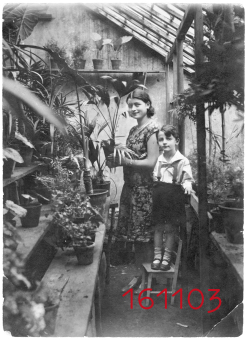Henryk Zwi Frank (*1923)

© Henryk Zwi Frank
Henryk Frank was born in Przemyśl, Poland, on July 27, 1923, the youngest child of master carpenter Jitzhak Frank and his wife, Henyah. Nusha, the oldest of his four elder sisters, was 14 years older than Henryk and often took him along on outings. On one of them, the photo of her with 5-year-old Henryk in the greenhouse at the edge of town was taken. Nusha Frank and the second-oldest sister, Batia, managed to immigrate to Palestine in 1932 and 1934, respectively. Henryk Frank belonged to the Zionist youth movement but attended a state-operated Polish school.
In the first few weeks after the Wehrmacht’s invasion of Poland in September 1939, Przemyśl was occupied by the Germans; in that time, hundreds of Jews were killed. The Jewish population was glad that the town’s eastern half, where the Franks also lived, was occupied by the Red Army. Jitzhak Frank’s woodworking shop became part of a cooperative of several hundred carpenters, in which both he and Henryk worked. In the afternoon, Henryk Frank went to trade school. With the Wehrmacht’s attack on the Soviet Union in June 1941, the eastern half of Przemyśl also was occupied by the Germans. Jews now had to do forced labor. In early 1942, the Franks were made to leave their apartment and live in the ghetto until late summer 1943, when 17,000 of its 20,000 inhabitants were deported, most to Belzec, in the space of a few days. Henryk’s entire family was deported; he never heard from any of them again.
Henryk Frank remained behind alone. He developed typhus, but nonetheless was sent to a labor camp near Przemyśl. In June 1943, he was taken to the Szebnie concentration camp, where he did forced labor as a carpenter. In September 1943, he was deported to Auschwitz and transferred, after three weeks in Birkenau, to the Buna/Monowitz concentration camp for forced labor. After two months in the cement detachment, he was put to work as a carpenter. His left hand got caught in a machine, and he lost his index finger and parts of his middle and ring fingers. Henryk Frank was operated on by a prisoner doctor in the infirmary, who protected him from selections on two occasions.
On January 18, 1945, the SS forced Henryk Frank and the other prisoners to go on a death march to Gleiwitz. From there, Henryk was taken to Buchenwald concentration camp for two weeks. Then, with several other inmates, he was assigned to an external work detachment of the Mittelbau-Dora concentration camp to do excavation work for the SS. In April 1945, he was deported by train to Theresienstadt, where he was freed by the Red Army.
Henryk Frank wanted to join his two sisters in Palestine. After a stay in the Landsberg DP camp, he finally managed to emigrate to Israel in 1947, and there he changed his name to Zvi Frank. In 1949, he met Tsilah, married her, and had a daughter and a son. Tsilah died in 1983, and since then Henryk Zvi Frank has lived alone in Kiryat Tivon, Israel.
(MN; transl. KL)





















